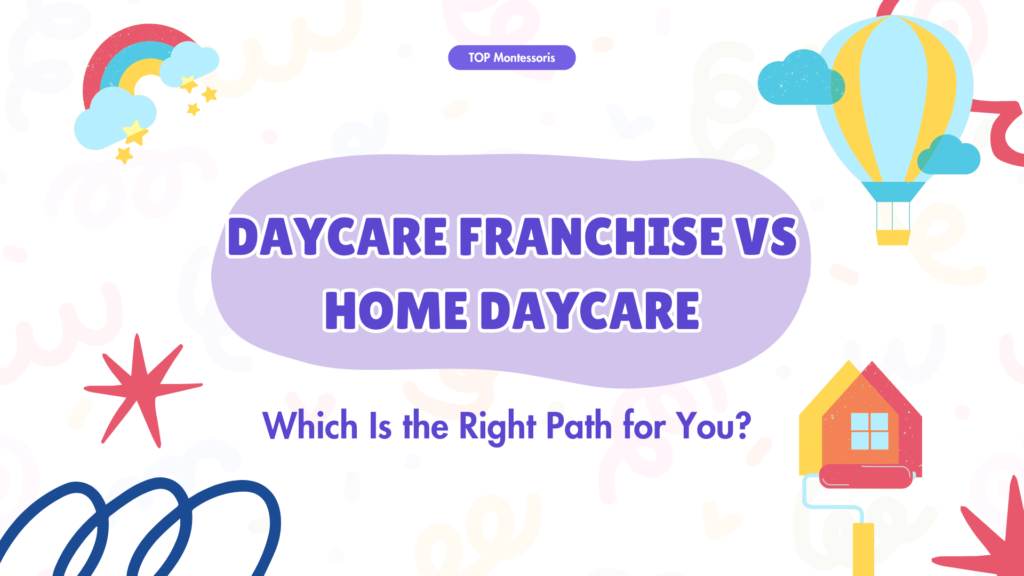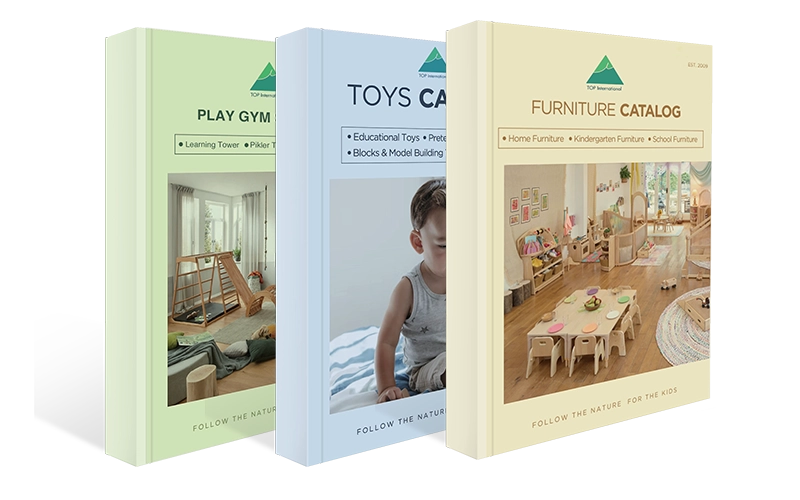Are you weighing the decision between launching a home daycare or investing in a daycare franchise in 2025? Wondering which path gives you more freedom, better profit margins, or a smoother startup? With so many factors to consider—costs, control, curriculum, and credibility—it’s not an easy call.
Each model offers unique advantages: a daycare franchise provides structure and brand recognition, while a home daycare offers flexibility, lower overhead, and greater autonomy. The best fit often comes down to your qualifications, available resources, long-term goals, and the kind of child care environment you’re confident delivering—and that local families are truly looking for.
In this article, we’ll break down the true pros and cons of daycare franchise vs home daycare—costs, operations, growth potential, and everything in between—to help you choose the path that truly fits your long-term goals in 2025.

What Is a Daycare Franchise?
A daycare franchise is a business model in which an individual operates a childcare center under the brand, systems, and support of an established franchisor. The appeal lies in its structure—investors gain access to pre-designed curricula, brand recognition, marketing support, and operational training, which can significantly reduce the learning curve for first-time operators entering early childhood education.
In essence, a child care franchise offers a faster, more predictable route into the market, but one that requires a willingness to operate within clearly defined boundaries. Understanding whether those boundaries align with your long-term goals is an important first step before committing to this model.

Daycare Franchise Opportunities
The U.S. childcare market continues to expand in 2025, driven by rising demand for structured early learning and dual-income households seeking reliable care. This has created numerous daycare franchise opportunities for investors looking to enter the sector with the support of an established system. Leading brands such as Kiddie Academy, The Goddard School, และ Lightbridge Academy are expanding across multiple states, often seeking franchise partners in high-growth suburban and urban areas.
In many cases, these opportunities are tied to regional demand and available real estate. For example, we frequently see inquiries about daycare franchises in Texas or Florida, where population growth and school-age demographics are especially strong. Some franchise systems provide location scouting support, market feasibility studies, and even assistance with facility design—factors that can reduce some of the uncertainty around starting a new childcare business.
Still, a good franchise opportunity doesn’t automatically guarantee long-term success. Variables such as local competition, lease costs, staffing availability, and regulatory complexity all play a role. In our experience working with childcare clients globally, the most successful projects—whether franchised or independent—combine solid market research, efficient space planning, and a reliable setup process, including sourcing high-quality, functional furniture that supports both learning and compliance.

What to Expect When Buying Into a Daycare Franchise
When entering a daycare franchise, you can expect to step into a structured system built on years of operational experience. Franchisors typically provide a complete framework—from curriculum and classroom management to safety protocols, branding, marketing materials, and administrative systems. For entrepreneurs who are new to early childhood education, this can eliminate much of the trial-and-error process involved in starting a business from scratch.
Another core benefit is the built-in support network. Most child care franchises offer comprehensive training before launch, as well as ongoing guidance through regional managers, internal learning platforms, and peer networks. New owners often participate in onboarding sessions, site visits, and annual conferences where they can share insights and challenges with other franchisees. This level of support is especially valuable in the first year of operation, when most owners face questions around licensing, staffing, and parent engagement.
That said, this model comes with clear financial and operational commitments. Franchisees typically pay a significant upfront franchise fee, followed by monthly royalties based on gross revenue. There may also be contributions to a national marketing fund. It’s critical to understand these obligations in full before signing. While the costs can be high, many see value in aligning with a recognizable brand and proven system, especially in markets where brand trust plays a role in enrollment decisions.

How to Start a Daycare Franchise
Starting a daycare franchise isn’t just about opening the doors to a classroom—it’s about launching a business with heart, vision, and operational excellence. The steps below will walk you through the real nuts and bolts of launching a daycare franchise that not only meets licensing requirements but also creates a nurturing space for children and a profitable business model for you.
Find the Best Daycare Franchise Fit for You
The first major decision is which daycare franchise brand to partner with. Not all franchises are created equal—some offer more support, stronger brand recognition, or more flexible operating models than others. You’ll want to look at:
- Initial investment requirements
- Royalties and fees
- Brand reputation
- Included training and support
- Flexibility in curriculum and design
Ask existing franchisees about their experience, and request an FDD (Franchise Disclosure Document) to analyze their financial performance and legal commitments. Take your time with this step—it’s not just a business relationship, it’s a long-term partnership.
Know the Real Cost Before You Commit
Buying into a daycare franchise means there are start-up costs and ongoing fees. Expect to cover:
- Franchise fee (anywhere from $30,000–USD 150,000)
- Real estate or lease costs
- Renovation and furniture setup (this is where we can help with competitive pricing!)
- Insurance and licenses
- Staff recruitment and training costs
Most franchisors will also charge royalties (5–7%) and possibly a marketing contribution on gross revenue. You’ll need a solid business plan and cash flow forecast before moving forward.
Many franchise owners choose to save costs by importing preschool furniture from China. That’s where we step in—our factory-direct Montessori and Reggio-style furniture can reduce set-up costs by 30–50% compared to U.S. prices.
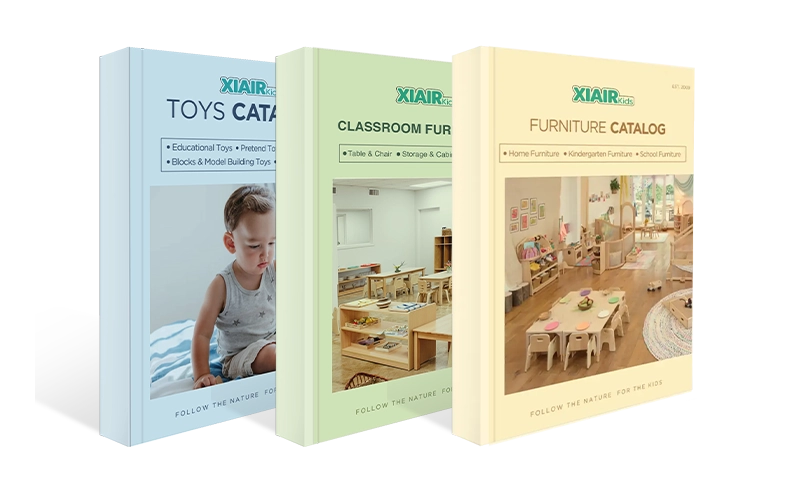
Receive a free catalog and custom layout to help you design your ideal classroom easily.
Choose the Right Location and Handle Licensing Early
Your location can make or break your daycare franchise. Look for:
- Proximity to residential neighborhoods
- Easy access for working parents
- Safety and parking availability
- Local demographics (young families = goldmine)
Once you’ve secured a lease or property, it’s time to deal with licensing and zoning. Each state or province has different requirements. In the U.S. or Canada, you’ll need:
- Local business licenses
- Childcare operating license
- Health and safety inspections
- Fire marshal approval
Some franchisors help with this process, but you’ll still need to stay on top of timelines, especially if you’re working against a kindergarten opening deadline. Any delay in inspections or furniture delivery can create massive issues later.
Furnish Your Center for Learning and Safety
Once your site is approved and licensed, it’s time to set up classrooms, rest areas, reception spaces, and staff offices. Your franchisor may provide a basic layout, but you’ll be responsible for:
- Ordering preschool furniture
- Selecting safe and eco-friendly materials
- Setting up learning centers
- Creating an engaging, child-friendly atmosphere
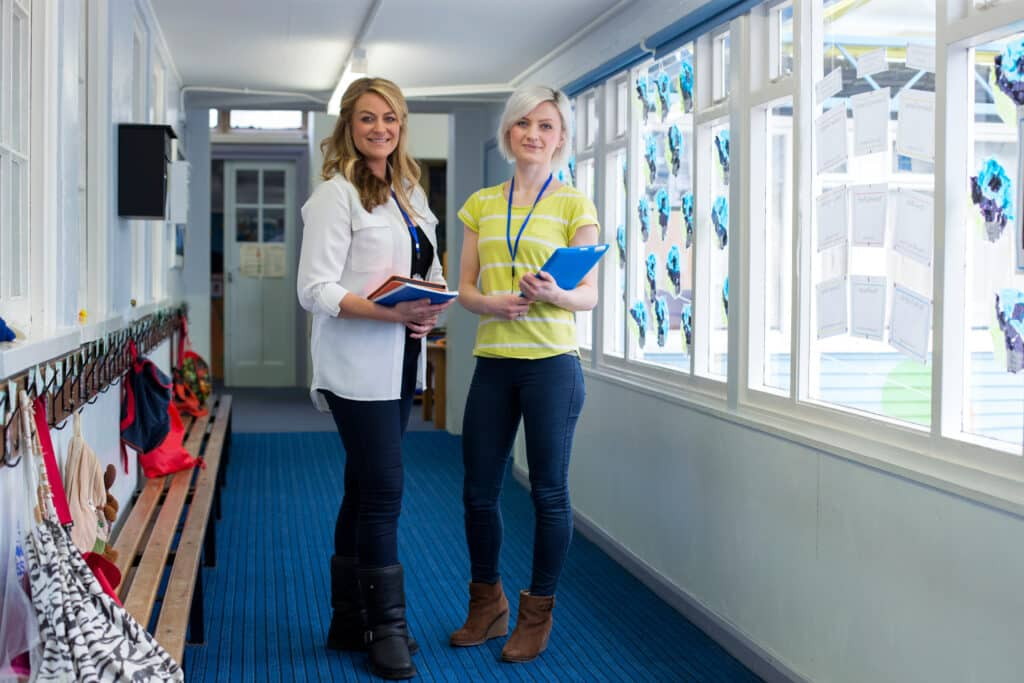
Hire qualified staff
Your daycare franchise is only as strong as the team running it. Parents aren’t just paying for a building—they’re trusting you with their children’s safety, development, and daily care. That trust lives or dies by your staff’s competence and warmth.
Most franchisors will specify minimum hiring standards, but you still need to vet and build a team that aligns with your center’s educational vision. Key hires include:
- Center Director or Manager
- Certified preschool teachers
- Teacher assistants
- Kitchen and cleaning staff
- Reception or admin support
Look for candidates with formal early childhood education (ECE) certifications and real-world classroom experience. If you’re using a Montessori or Reggio-inspired curriculum, hire staff trained in those methods—or be prepared to train them.
Pay attention to state or provincial child-to-teacher ratios, background checks, and ongoing training requirements. A daycare franchise can face penalties or lose its license if these aren’t properly managed.
Develop policies and procedures
Every successful daycare franchise operates with a strong internal framework. While your franchisor may give you a basic handbook, you must customize your center’s policies to meet local laws, staff structure, and parent expectations.
Your daycare should clearly outline:
- Attendance and late pick-up rules
- Emergency evacuation plans
- Sick child and health protocols
- Daily schedules and learning objectives
- Meal, nap, and toilet training procedures
- Disciplinary strategies and communication guidelines
These policies aren’t just formalities—they form the operational spine of your business. They help staff act consistently and give parents confidence in your professionalism.
Don’t forget to involve a legal advisor or local licensing body when drafting your procedures. And be ready to train all new hires thoroughly on them during onboarding.
Use clear signage and printed manuals across your facility. When policies are communicated well, they reduce confusion, improve parent satisfaction, and protect you legally.

Attract Local Families and Fill Every Seat
Even with a well-known brand behind you, a daycare franchise isn’t going to fill itself. You need a local marketing strategy that gets parents through the door and children into seats.
Here’s what to include:
- Google Maps and Business Profile listing
- Local SEO for “daycare near me” searches
- Open house events with free tours
- Facebook and Instagram ads targeting parents
- Testimonials and reviews from early enrollees
- Parent referral programs with incentives
Many daycare franchisees launch with a soft opening, offering discounted rates or trial periods to generate buzz. Make sure your marketing reflects the warmth and professionalism of your environment—and always lead with trust, safety, and learning outcomes.
Take Full Advantage of Franchise Support
One of the biggest advantages of joining a daycare franchise instead of starting independently is the support system behind you. Don’t waste it.
Most reputable franchisors provide:
- Pre-opening training (business systems, safety, parent communication)
- Ongoing professional development for staff
- Business coaching and mentorship
- Field visits and operational audits
- Curriculum updates and seasonal plans
- Centralized marketing templates and tools
Don’t treat this as optional. Leverage everything available. Many struggling franchisees fail simply because they try to go it alone, even after paying for a full support structure.
Create a rhythm where your team engages regularly with the brand’s resources. Whether it’s attending quarterly webinars, using updated lesson plans, or calling your franchise mentor when enrollment dips, use it. That’s what you’re paying royalties for.
Exploring Independent Daycare Options
For individuals seeking more autonomy and lower startup costs, launching an Independent daycare can be a practical and rewarding alternative to franchising. Unlike a daycare franchise, which operates within a fixed brand framework, a home daycare allows you to build a childcare program that reflects your own educational values, family culture, and local community needs. This level of control often appeals to educators, stay-at-home parents, and first-time operators looking for a more personal and flexible approach.
One of the key advantages of running an Independent daycare is cost-efficiency. Without franchise fees or brand restrictions, the upfront investment is significantly lower. You can choose your suppliers, design your own learning space, and furnish your environment according to your specific philosophy—be it Montessori, play-based, or Reggio-inspired. Many of our clients in North America have taken this route, using high-quality yet affordable preschool furniture to create warm, functional spaces on a manageable budget.

Receive a free catalog and custom layout to help you design your ideal classroom easily.
Daycare Franchise vs Independent Daycare: Pros and Cons
Daycare Franchise
A daycare franchise provides a standardized system for launching and running a childcare business, backed by an established brand. For many first-time investors or operators, it’s seen as a lower-risk way to enter the early childhood education industry. However, that structure also comes with limitations in cost and autonomy.
Pros
1. Proven Business Model and Curriculum
Franchise daycares operate under a tested educational and operational system. Everything from daily schedules to safety protocols and classroom setup is guided by corporate standards, making it easier for new operators to start with confidence.
2. Corporate Support and Training
One of the biggest advantages of owning a child care franchise is access to comprehensive support. Franchisors offer pre-opening training, licensing guidance, operational manuals, and ongoing business coaching. For those unfamiliar with how to open a daycare franchise, this structured guidance can be a game-changer.
3. National Brand Recognition
Parents often associate franchise names with quality and consistency. In competitive suburban or urban markets, the brand’s reputation can be a major asset in enrollment. A known name often builds trust faster than an independent center.
4. Streamlined Facility Planning
Franchise systems typically provide layout templates and equipment lists for classrooms. Some even require specific preschool furniture vendors, which ensures brand consistency but also simplifies compliance with licensing inspections and early learning standards.
Cons
1. High Initial and Ongoing Costs
The average daycare franchise cost can range from $250,000 to $750,000+, including franchise fees, build-out, staff training, furniture, licensing, and working capital. Ongoing royalty fees and marketing contributions typically apply, taking a percentage of monthly revenue.
2. Limited Purchasing Flexibility
Franchisors often require owners to use pre-approved vendors for items like educational supplies, software, and classroom furniture. This restricts your ability to choose affordable or customized solutions from independent manufacturers, which can impact budgeting and design freedom.
3. Restricted Brand Autonomy
While you’re the business owner, your use of the brand is licensed, not owned. Marketing materials, curriculum changes, even the look and feel of your center must align with the franchisor’s brand identity. This can be limiting for entrepreneurs with strong personal visions.
4. Territory and Expansion Limitations
Franchise contracts often define geographic territories. This can restrict your ability to open additional locations nearby, even if local demand supports it. For multi-site operators, this is a strategic consideration.

Independent daycare
A Independent daycare offers an alternative path for individuals who prefer full operational freedom, a lower barrier to entry, and a more intimate childcare setting. Though smaller in scale, home daycares play an essential role in many communities and offer a highly personalized care experience.
Pros
1. Low Startup Costs
Compared to the high daycare franchise cost, an Independent daycare can often be started for under $20,000. Without franchise fees, leasing commercial space, or hiring full administrative teams, the initial investment is much more manageable, especially for educators or stay-at-home parents.
2. Full Autonomy and Flexibility
As an independent operator, you make all decisions. From choosing a curriculum to sourcing preschool furniture, branding, marketing, and scheduling, you control the direction of your program. This is particularly valuable for those who want to build a learning environment around Montessori, Reggio Emilia, or play-based education.
3. Personalized, Intimate Environment
Many families are drawn to the warmth and closeness of a small home-based childcare setting. With fewer children and a consistent caregiver, trust often forms quickly, and retention tends to be higher. This model supports emotional stability and individualized attention.
4. Open Supplier Access
You’re free to work with any vendors you prefer, whether it’s local furniture factories, sustainable toy manufacturers, or customized curriculum providers. Many of our clients have used this flexibility to build beautiful, cost-effective learning spaces with tailored layouts.
Cons
1. Limited Capacity and Revenue Ceiling
Licensing regulations often cap the number of children you can enroll, commonly between 6 to 12. This naturally limits your revenue potential unless you expand into a larger space or add staff.
2. No Institutional Support
There’s no franchisor to turn to for help. You are responsible for licensing, marketing, operations, and compliance. It requires proactive learning and strong self-management skills.
3. Harder to Build Reputation
Without a recognized brand name, you must build trust and visibility from the ground up. In some areas, that process can take time and investment, especially if competing against well-known franchise daycare centers.
4. Work-Life Balance Challenges
Running a daycare from home means your living and working spaces are intertwined. Without clear boundaries, it can become difficult to separate personal time from business operations.

Licensing, Regulations & Certification
Whether you’re opening a daycare franchise or launching an Independent daycare, compliance with licensing and regulatory standards is non-negotiable. Every state or region has its own set of requirements, covering everything from fire safety and staff qualifications to space per child, sanitation, emergency exits, and even furniture layout.
The difference lies in who handles the process, how much support you receive, and how flexible your space can be during setup.
Daycare Franchise
Most established child care franchises provide extensive licensing support to their franchisees. This typically includes checklists, documentation templates, classroom layout diagrams, and guidance on local inspection protocols. Some even assign a dedicated team to liaise with municipal authorities, particularly in U.S. states like Texas, Florida, and California, where demand and competition are high.
Because franchises must protect their brand reputation, they often follow higher internal standards than the minimum local requirements. That means franchisees may face additional build-out specifications, such as precise classroom furniture types, minimum square footage per child, or even corporate-approved playground designs. While these help ensure quality and consistency, they may also lengthen the approval process and limit flexibility in space usage.
Franchise systems also tend to pre-select vendors to meet regulatory standards. For example, some networks only approve furniture suppliers that meet certain safety or flame-retardant certifications. This benefits franchisees who want predictable quality, but can be a barrier for those seeking customized or budget-friendly options.
Independent Daycare
For Independent daycare operators, licensing is entirely self-managed. Requirements often vary by city or county and may include home inspections, child-to-staff ratios, food safety standards, and CPR/first aid certifications. While the standards may be more relaxed than for commercial daycare centers, the burden of preparation falls fully on the owner.
Many regions offer expedited licensing paths for home-based providers, especially if they care for fewer than a certain number of children. That said, without corporate support, navigating the paperwork, inspections, and documentation can be time-consuming, particularly for those unfamiliar with how to start a daycare.
One advantage, however, is flexibility. Independent daycare operators can often design their learning space based on personal preference, as long as it complies with basic health and safety codes. This gives owners more freedom in choosing preschool furniture, storage solutions, and play areas that fit their space and teaching style.
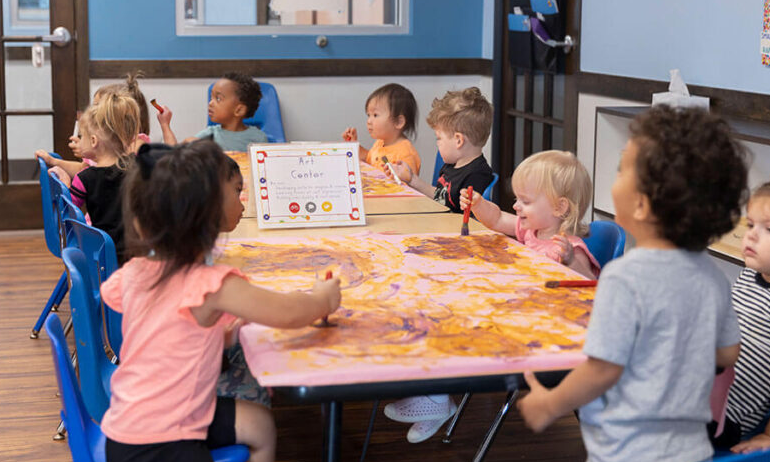
Branding, Marketing & Enrollment
In the early childhood education industry, reputation and visibility play a decisive role in enrollment success. Parents are highly selective when it comes to choosing where their children will spend their early years, and their decisions are often influenced by branding, perceived quality, and word-of-mouth trust.
How these elements are built and leveraged depends greatly on whether you operate a daycare franchise or an independent daycare.
Daycare Franchise
A major benefit of joining a childcare franchise is access to a nationally recognized brand. Companies like Kiddie Academy, The Learning Experience, และ Lightbridge Academy have spent years building public trust through consistent messaging, corporate marketing campaigns, and customer reviews across multiple locations. This level of brand recognition can give new franchisees a significant head start when entering a competitive market.
Franchise systems typically provide standardized marketing materials, social media templates, enrollment software, and sometimes even localized SEO and pay-per-click advertising support. In addition, the centralized website often generates inquiries that are funneled to franchisees based on territory.
This makes launching faster and more scalable, especially for those who don’t have experience in digital marketing or sales. However, this also means franchisees have less control over how they present their location to the community. Marketing must follow brand voice and guidelines, leaving little room for local customization.
In some cases, marketing fees (often 1–2% of gross revenue) are required as part of the overall daycare franchise cost, further increasing operational expenses.
Independent Daycare
Marketing an Independent daycare is a more grassroots process, but also one that allows for greater personalization and direct connection with the local community. Without a franchisor’s support, owners are responsible for building their brand from scratch. This includes designing a logo, setting up a website, running social media, creating flyers, and generating reviews and referrals organically.
While this may seem daunting at first, many Independent daycare providers build loyal client bases through word-of-mouth, parent groups, local listings, and neighborhood trust. In close-knit communities, a strong personal reputation can be just as powerful as national branding.
Additionally, independent operators have full control over their messaging, tone, and curriculum positioning. They can highlight unique features—such as a Montessori-inspired setup, multilingual environment, or eco-friendly materials—and adjust their enrollment strategy based on what local families are seeking.
That said, building enrollment momentum can take longer without corporate infrastructure. And success often depends on how well the operator understands the local market and can communicate value clearly, both online and in person.

Comparing Costs: Daycare Franchise vs Independent Daycare
When planning to open a childcare business, understanding the true cost behind each model is critical. Whether it’s a daycare franchise with built-in systems or a home daycare built from scratch, the financial requirements vary greatly, and often influence the direction new owners take.
Here’s a side-by-side breakdown of how the costs typically compare.
Daycare Franchise: Cost Structure
1. Initial Franchise Fee
Most well-known child care franchises charge an upfront franchise fee ranging from $50,000 to $150,000, depending on the brand and location. This fee gives you access to the brand name, systems, training, and support.
2. Build-Out and Furnishing
Opening a franchise location often requires building or leasing a commercial space that meets strict facility and safety standards. Build-out costs can range from $150,000 to $300,000, with เฟอร์นิเจอร์ห้องเรียน, cubbies, child-safe shelving, และ indoor play equipment adding an additional $30,000 to $50,000, especially when required to use pre-approved vendors.
3. Licensing & Legal Fees
Though franchise systems help guide the process, state-specific licensing, permits, and legal compliance still come with costs. Most franchisees should budget at least $10,000 to $20,000 for licensing, background checks, insurance, and legal consultations.
4. Staffing & Training
Staff recruitment, background screening, training, and benefits packages are essential. Initial staff setup can cost $20,000 to $50,000, depending on the number of employees and local wage laws.
5. Marketing and Enrollment Setup
Franchisees usually contribute 1–2% of their monthly revenue to a national marketing fund. In addition, many spend $5,000 to $15,000 locally for signage, launch campaigns, and digital ads.
6. Ongoing Royalties
Most franchise daycares charge a royalty fee of 5–7% of monthly gross revenue, reducing long-term profitability. This can add up to tens of thousands annually, depending on enrollment.
Estimated Total Investment Range:
$250,000 – $750,000+
Independent Daycare: Cost Structure
1. Space Preparation
Since you’re using your own home, no commercial lease is needed. However, converting a space into a licensed childcare environment still requires safety gates, cleaning systems, and minor renovations. This can cost $2,000 to $8,000, depending on local codes.
2. Licensing & Registration
State requirements vary, but most home daycare providers must pass inspections, complete training, and acquire basic insurance. Expect to spend $500 to $3,000 on licensing and setup fees.
3. Furniture & Learning Materials
Without brand restrictions, you can choose budget-conscious or Montessori-style preschool furniture, open-ended toys, sensory tables, และ flexible seating options. Many of our home-based clients successfully equip their classrooms for $3,000 to $7,000.
4. Marketing & Branding
As an independent provider, you’ll need to design your logo, create a website, and market locally. Marketing costs are modest compared to franchise models—often $500 to $2,000 for flyers, business cards, and online listings.
5. Staffing
Many Independent daycare providers start as solo operators. If you add an assistant, plan for part-time wages based on local labor laws.
Estimated Total Investment Range:
$5,000 – $20,000
Long-Term Financial Considerations
While franchise daycare models can generate higher gross revenue due to scale, the ongoing royalty structure, vendor limitations, and lease obligations reduce profit margins over time. You also need to reach a minimum enrollment level just to break even.
In contrast, Independent daycare operations may generate less revenue but achieve profitability faster thanks to lower overhead. Without franchise fees or royalty deductions, more of your earnings stay in your business. For many operators, especially those testing the market, the home model offers a lower-risk entry point.

Receive a free catalog and custom layout to help you design your ideal classroom easily.
Daycare Franchise: Frequently Asked Questions (FAQs)
Q1: Which model is more profitable—a daycare franchise or an Independent daycare?
A: It depends on your business goals and scale. A daycare franchise may generate higher gross revenue due to greater capacity, but it also involves higher costs—franchise fees, royalty deductions, and mandatory vendor expenses. An Independent daycare usually reaches profitability faster thanks to lower overhead, especially in the first 1–2 years.
Q2: How much does a daycare franchise cost compared to an Independent daycare?
A: A franchise daycare typically requires $250,000 to $750,000+ in startup capital. That includes construction, staffing, licensing, classroom furniture, and branding. In contrast, an Independent daycare can often be launched for as little as $5,000 to $20,000, depending on how much of your home is used and how much customization is needed.
Q3: Does a daycare franchise offer better support during setup?
A: Yes. Childcare franchises provide structured training, operational guidance, branding materials, and licensing assistance. For first-time business owners, this support can reduce risk. However, it also means giving up some creative and operational control, including restrictions on furniture vendors, layout, and marketing style.
Q4: Is it easier to customize an Independent daycare?
A: Absolutely. Independent daycare owners have full freedom over how they furnish, decorate, and design their space. From Montessori furniture to bilingual learning materials, you’re free to adapt based on your educational philosophy and budget, something that’s limited under most franchise models.
Q5: Which model gets licensed faster?
A: Independent daycares generally have simpler licensing paths because they operate at a smaller scale. Some states offer expedited approval for providers caring for fewer than 8–12 children. In contrast, franchise daycares must often meet commercial building codes and undergo multiple rounds of inspection, which can lengthen timelines.
บทสรุป
Both daycare franchises and Independent daycares offer distinct advantages for aspiring childcare operators in 2025. The right choice ultimately depends on your business priorities, available resources, and the type of environment you want to build. Some may be drawn to the operational support and brand visibility of a child care franchise, while others value the independence, flexibility, and intimacy of running a daycare from home. Neither path is inherently better—the key is identifying which model aligns with your long-term goals and capacity.
Whichever route you choose in the Daycare Franchise vs Independent daycare decision, what matters most is creating a safe, nurturing, and developmentally appropriate space for young children. From meeting local licensing requirements to selecting the right staff and learning tools, attention to detail at every level is essential. That includes your learning environment. Trusted manufacturers like ท็อป มอนเตสซอรี่ play a quiet but important role in supporting childcare providers, ensuring that classrooms, whether franchised or home-based, meet safety standards while staying child-focused and adaptable. With the right foundation in place, your daycare—whatever the model—can truly thrive.

